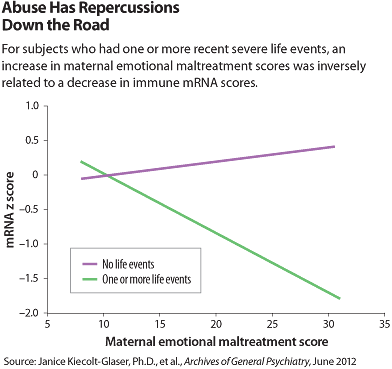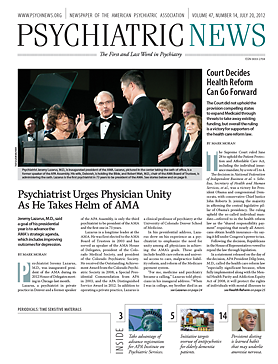As psychiatrists know only too well, parental emotional abuse can leave lasting psychological scars.
But it looks as if parental emotional abuse can also weaken defenses against cancer many years later, at least if it is combined with a recent severely stressful event, a study reported in the June Archives of General Psychiatry suggests.
The senior author was Janice Kiecolt-Glaser, Ph.D., a distinguished university professor at Ohio State University and an expert on stress and immunity.
Kiecolt-Glaser and her colleagues studied 91 individuals with basal cell carcinoma, which is not just the most common kind of skin cancer, but the most common type of cancer in the United States. The antipathy and neglect subscales of the Childhood Experience of Care and Abuse Questionnaire were administered to the subjects to determine if they had experienced parental emotional abuse as children and, if so, to what extent.
The subjects were also evaluated with the Life Events and Difficulty Schedule to determine if they had experienced any severely stressful life event, such as death of a loved one, divorce, or job loss, within the previous year.
The scientists also biopsied the subjects’ basal cell carcinoma tumors and measured within the biopsy tissue levels of mRNA that make four types of proteins located on immune cells and that are known to reflect immune response to basal cell carcinoma tumors.
The scientists then evaluated whether parental emotional abuse interacted with a severely stressful life event of the prior year to predict immune response to basal cell carcinoma. They found that such a relationship did exist, even when possibly confounding factors such as age, gender, history of depression, or current depressive symptoms were considered.
Specifically, among subjects who had experienced a severe life event within the prior year, those who indicated that they had been emotionally maltreated by their mothers or fathers showed a significantly poorer immune response to the tumors than did subjects who had experienced a severe life event within the prior year, yet had not been emotionally maltreated by a parent.
The scientists also assessed whether parental emotional abuse predicted immune response to basal cell carcinoma when subjects had not experienced a severely stressful life event during the prior year, but they did not find evidence of such a link.
Thus, “troubled early parent-child relationships, in combination with a severe life event in the past year, predicted immune responses to a basal cell carcinoma tumor,” the researchers concluded.
This study, from “leaders in the field of psychoneuroimmunology … complements work showing that early life trauma resets the hypothalamic-pituitary-adrenal axis, making it hypersensitive to subsequent stressors decades later,” David Spiegel, M.D., associate chair of psychiatry at Stanford University School of Medicine and a psycho-oncologist, told Psychiatric News.
The study also contributes to the understanding of how “our stress-response systems can indeed affect our body’s response to tumor invasion,” Spiegel said.
And “while basal cell carcinoma is a relatively benign cancer, there is increasing evidence that immune function is crucial in cancer surveillance, especially in regard to the growth of metastases,” he pointed out. So if parental emotional abuse combined with recent stress can lower immune defenses against basal cell carcinoma, then it might also be able to do so with other kinds of cancer, he indicated.
Kiecolt-Glaser concurs on this point, she told Psychiatric News —at least regarding those cancers where the immune system plays a prominent role, such as HIV-related cancers or kidney cancer.
The study was funded by the National Cancer Institute, American Cancer Society, Ohio State University Comprehensive Cancer Center, and Gilbert and Kathryn Mitchell Endowment.


